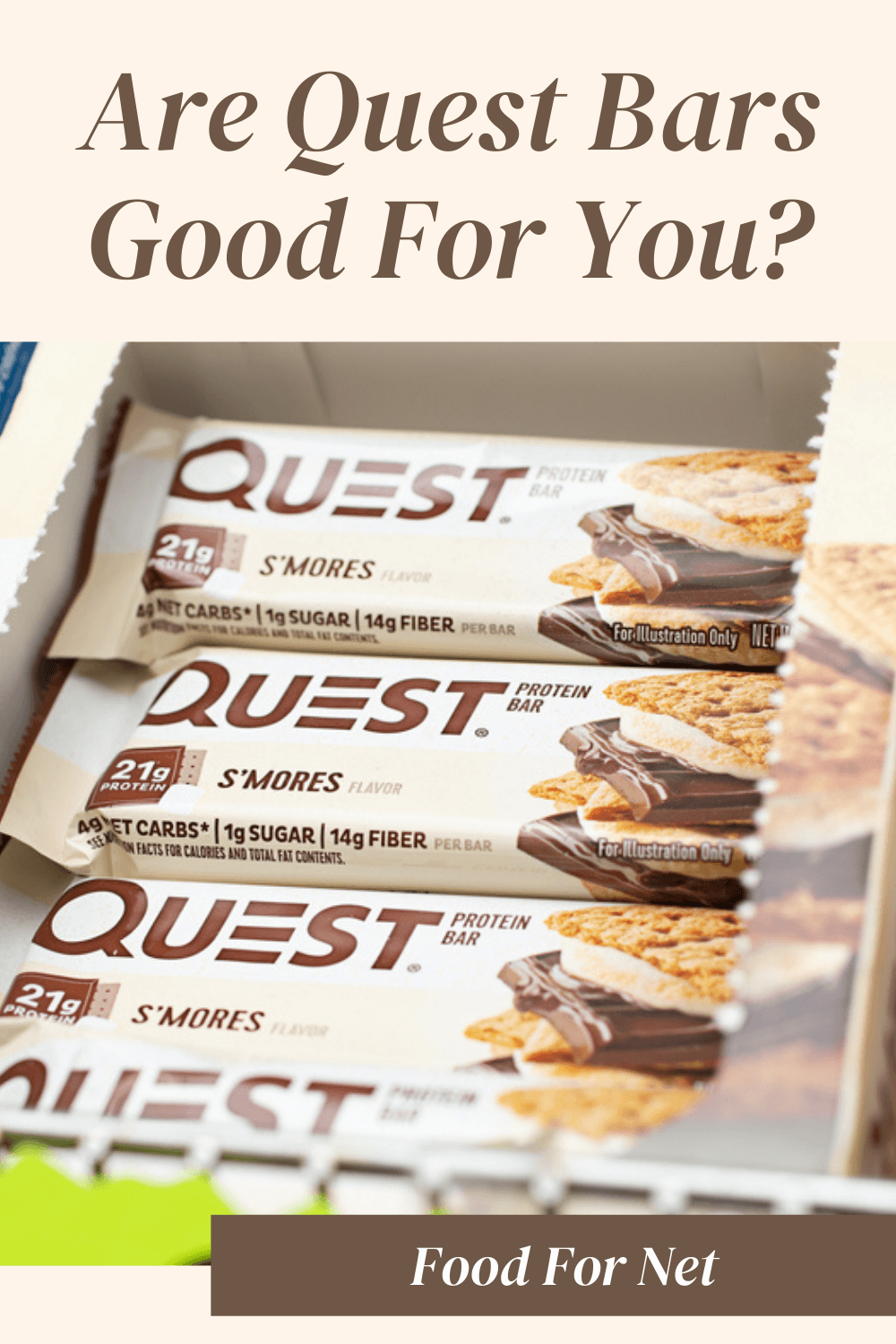
Quest Nutrition has become a leader in protein-based snacks, offering an impressive range of bars, cookies, candy, protein shakes, and even chips. The products all seem like an exceptional way to boost your protein intake, especially as they’re high in protein and low in sugar. So are quest bars good for you?
The protein bars come in a variety of styles, including snack bars, protein bars, mini protein bars, and hero bars. While there are similarities between these, there are key differences too. There are also plenty of delicious flavors. The combination of flavors and styles should mean that there is something for everyone.
Wouldn’t it be amazing if Quest bars really were delicious and healthy? So, are they? Are Quest bars good for you? There are certainly benefits, especially for people who need extra protein in their diet.
It’s still important to be critical, though, as there’s no shortage of protein rich snacks out there, including protein shakes and plant-based protein bars. Are Quest bars healthy and good enough to deserve a place in your diet?
Are Quest Bars Good For You?
- Types Of Quest Bars
- Benefits Of Quest Bars
- How Quest Bars Could Be Harmful
- Is Soluble Corn Fiber Healthy?
- Can Quest Bars Replace Meals?
- Will Quest Bars Help You Lose Weight?
- What About Other Quest Products?
- Do You Need The Protein?
- Final Thoughts
Types Of Quest Bars
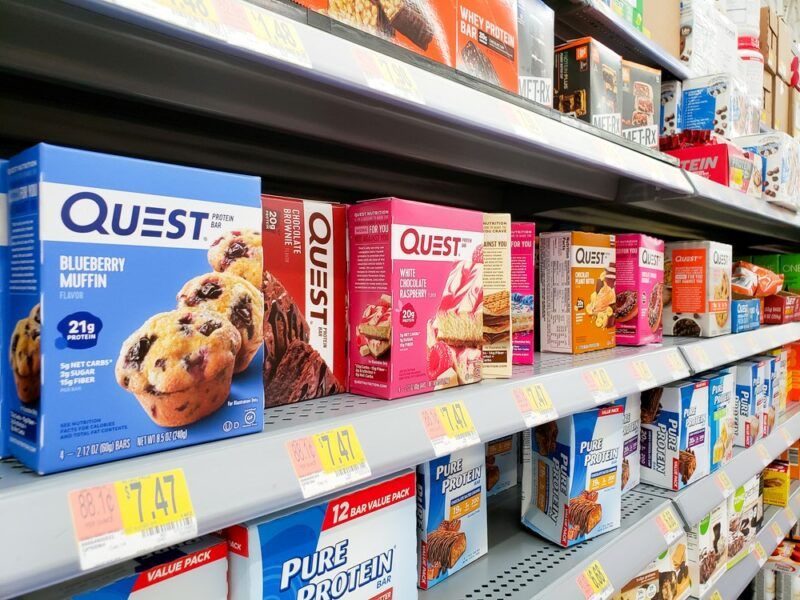
Before we get into the benefits and risks of Quest bars, let’s see what they have to offer. These are a few types to choose from. These vary in their features and may be useful in different situations.
Quest Protein Bars
These are Quest’s main protein bar product. They come in a host of flavors, including Caramel Chocolate Chunk, Chocolate Brownie, Chocolate Chip Cookie Dough, and even Birthday Cake. They tend to get good reviews too, suggesting that they are actually delicious.
The bars have plenty going for them nutritionally too, as they contain 20 grams of protein and 17 grams of fiber, along with just 6 grams of fat and 1 gram of sugar. A whole bar contains just 180 calories, which is pretty amazing for the amount of protein present.
Quest Protein Bar Minis
As the name suggests, these are smaller versions of the protein bars. Each one contains just 80 calories and includes 8 grams of protein and 4 grams of fiber.
The protein content means that these would work well as a snack between meals, but they could never be a meal replacement.
Snack Bars
Quest also offers a Peanut Chocolate Crunch bar that’s another interesting between meal choice. This one contains 10 grams of protein per serving and 7 grams of fiber.
It’s a little higher in net carbs, so it wouldn’t be such a good choice for keto dieters. However, there’s still only 1 gram of sugar per serving.
Hero Bars
These bars are a little different again. This time, there is 17 grams of protein per serving, but just 6 grams of fiber.
The bars also use an unusual sweetener – allulose. This is a rare naturally occurring sugar that doesn’t impact blood sugar levels and is lower in calories than sugar.
Benefits Of Quest Bars

A Source Of Quality Protein
Quest bars are excellent for protein. You get up to 20 grams of protein per bar and this comes from milk.
Not only that, but you’re getting a complete source of protein, one that contains all the amino acids you need. This should make the bars excellent for muscle development.
Plus, we’re talking about a convenient source of protein. The bars are already prepared, so you can eat them when needed. No mess. No fuss.
They’re shelf stable too. You can simply keep them in your cupboard, handbag, or desk at work for a quick snack when you need it.
The Fiber Promotes Gut Health
Quest bars are also excellent for fiber, ranging from 6 grams to 17 grams of fiber, depending on the type you choose. This is a powerful feature and is somewhat unusual, as most protein bars tend to be lower in fiber.
Fiber is incredibly important. It plays vital roles in our digestive systems, while also balancing our blood sugar and cholesterol levels.
In this case, much of the fiber is soluble. Soluble fiber is particularly relevant for digestion and helps you feel full for longer.
Here’s another interesting function. Soluble fiber acts as a prebiotic, which means that it is a source of food for your gut bacteria. This is a useful effect, as a good balance of gut bacteria has been associated with all kinds of health benefits.
They’re Lactose Free
Quest bars use whey protein and milk protein as ingredients, but despite this, they’re lactose free. That’s because the processing steps used to extra the protein from milk remove lactose at the same time.
They Can Be Keto Friendly
Some of the Quest bars work for keto dieters too. For example, their regular protein bars contain 4 net grams of carbs per serving, while some others are even lower than this. This is extremely useful as other easy to find snacks are often high in carbs.
That said, the protein bars aren’t perfect for keto. You’re normally trying to keep fat intake high and only have moderate amounts of protein, while Quest bars are high in protein and low in fat. The amount of protein isn’t ideal either, as most keto dieters focus on whole food ingredients.
The bars shouldn’t knock you out of ketosis, but they’re best seen as an occasional snack rather than something to rely on every day.
It’s also important to pay attention to how your body responds. Some keto dieters say that some of the soluble corn fibers may be digested, so the carb content may be a little higher than you expect.
There Are Plenty Of Tasty Flavors
Quest seems to have the flavor equation licked, as their product line contains a huge range of flavors and most of them are well-received. This is particularly true if you’re looking at their classic protein bars, as there are more than a dozen different flavors.
You can’t find all the flavors at the same time in the same location, but you should be able to find at least a few of them. If not, you could always order through Quest’s own website.
How Quest Bars Could Be Harmful
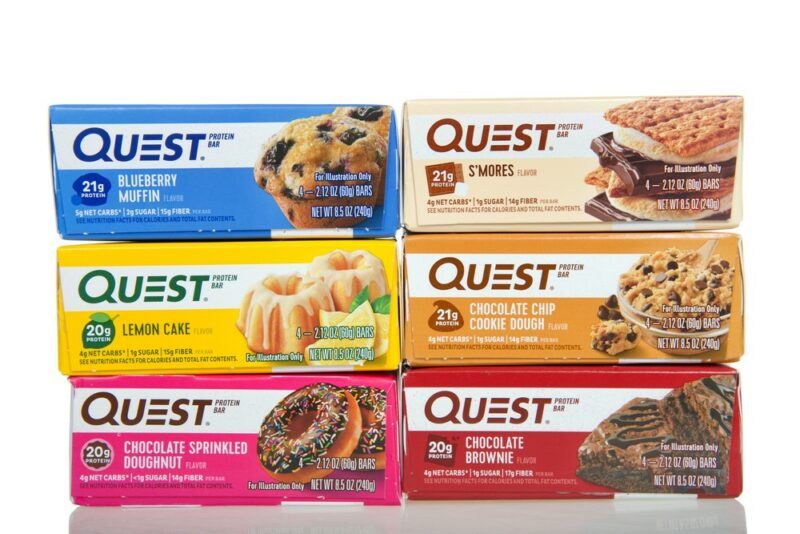
May Lead To Side Effects
While most people can eat Quest bars without a problem, some do experience side effects, including stomach cramps and diarrhea.
There are two main culprits here. The first is erythritol, which is a type of sugar alcohol. Then there’s the soluble corn fiber.
Both ingredients offer benefits and most people can consume them without a problem. There are exceptions though, with some people experiencing significant side effects from one or both of these ingredients.
Because these side effects are highly individualized, you’ll need to experiment for yourself. The best way to do so is to start small. Rather than eating a whole bar, just have a quarter and wait a while. This will give you the chance to see how your body responds.
They Use Sucralose
Quest bars mostly rely on natural sweeteners, including erythritol and stevia. It’s easy to miss the fact that they also use sucralose.
Sucralose is an artificial sweetener instead and it’s also controversial. Some theories suggest that it could promote inflammation and cause harm to your gut bacteria.
There’s also debate about the blood sugar impact. One study showed that sucralose could lead to blood sugar and insulin responses for obese patients who hadn’t used the sweetener before.
While that effect might disappear after using sucralose for a while, it does show that sucralose can influence blood sugar for some people in some situations.
There’s another thing to mention about sweeteners too – many of the Quest products use three different types of sweeteners. This isn’t great, especially as most safety testing looks at the effects of sweeteners independently. Much less is known about the effects of regularly consuming multiple types of sweetener simultaneously.
As such, it’s essential to pay close attention to how your body responds. Anyone diabetic may also want to watch their blood sugar levels to ensure there aren’t any unexpected responses.
There Are Other Additives Too
Quest bars use fewer additives than many other protein bars on the market, but there are still some concerning ingredients.
One of these is carrageenan, which shows up in some of their protein bars. This is a popular thickener that is often used in processed foods, but there are also concerns about the health impacts. Carrageenan could potentially increase inflammation and raise the risk of some health conditions.
Such effects are yet to be proven, but the potential is certainly there. Besides, it’s not like carrageenan offers any health benefits, so why not skip it?
There are also natural flavors. These often aren’t as natural as they sound, as they can be processed using chemicals and may even include some artificial additives. There can also be many chemicals present, so you don’t really know what you’re consuming at all.
The Quality And Ingredients Can Change
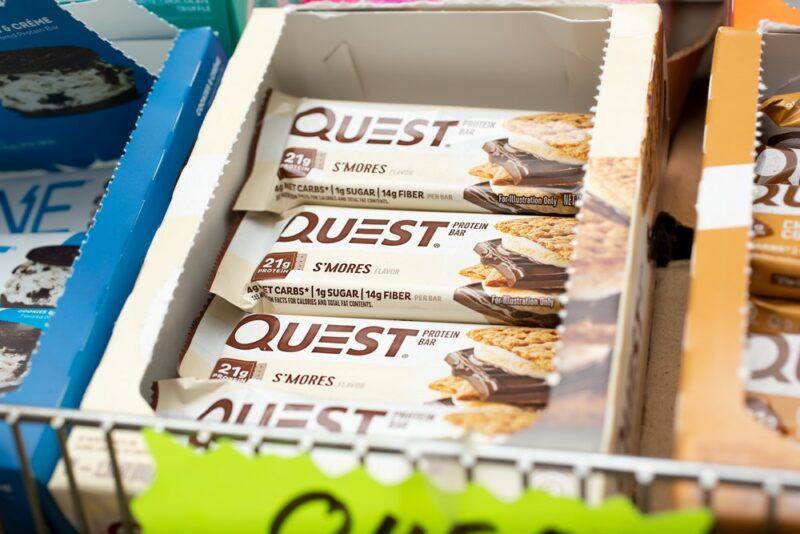
Even if you enjoy Quest bars right now, there’s no guarantee that you will in the future. Companies often change their formulations over time, which sometimes means that the flavor or texture changes as well – along with additions and removals of ingredients.
This issue is often mentioned in Amazon reviews, where some customers went from loving to hating the bars after a recipe change.
You may also see quality differences. Sometimes there’s an issue with a batch. Other times the store or seller that you get the bars from didn’t store them well. Either way, the bars mightn’t always be as good as you expect.
Of course, this issue isn’t limited to Quest. Most processed products experience some recipe changes and quality differences periodically.
They Use Palm Oil
Some of Quest’s products also use palm oil as an ingredient. The big problem here is environmental harm, as palm oil leads to considerable deforestation and pollution, while also destroying the habitats of many endangered species.
It’s a shame to see Quest relying on palm oil when there are so many more sustainable options out there. Palm oil isn’t great for health anyway, as it’s high in saturated fat.
They’re Not Vegan Friendly
Quest bars rely on milk protein and whey protein, so they’re not a good choice for vegans. Unusually, they don’t seem to have any vegan friendly products.
They’re Heavily Processed
The final issue to mention is processing. While Quest bars use healthier ingredients than many other products, they’re still heavily processed.
Processed foods have been linked to an almost endless array of health problems, particularly if you rely on them regularly. This effect is partly because processed foods often aren’t that nutritious. They also contain additives and many of the natural compounds found in whole foods get lost during the processing steps.
And, let’s be honest, do you really need an ultra processed protein bar anyway? You can easily make batches of protein bars at home, giving you a minimally processed product that’s much more nutritious.
Plus, that way, you know exactly what is and isn’t in your protein bar. With something processed, you need to trust the manufacturer’s claims and hope that the final product is as healthy as they suggest.
Is Soluble Corn Fiber Healthy?
Quest does a pretty good job of minimizing their use of additives. However, they do rely on soluble corn fiber as one of their main ingredients. This is why the bars have 17 grams of fiber per serving, while other companies often contain barely any fiber at all.
The fiber does offer similar benefits to other sources of soluble fiber, like helping with your gut bacteria and your digestion.
However, it isn’t quite the same as the fiber found in whole foods, as it is broken down using enzymatic hydrolysis. The fiber also comes from corn, which is often genetically modified. Quest does say that their products are always GMO-free, but they don’t use any GMO-free labeling on their bar and could easily change their mind in the future.
For the most part, soluble fiber appears to be healthy and shouldn’t put your health at risk. Still, it’s never going to be as powerful as getting fiber from whole foods instead.
Can Quest Bars Replace Meals?
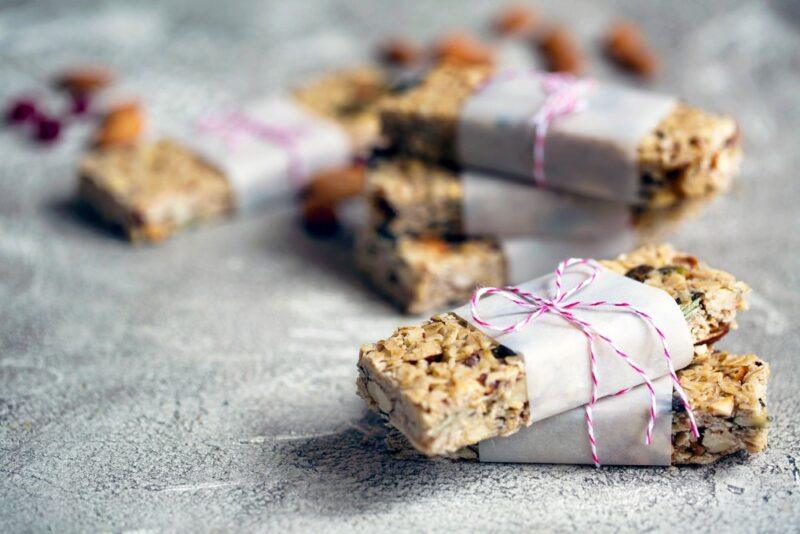
Protein bars are often used as meal replacement products. This is an easy way to lose weight, as the bar’s protein helps keep you full, while you’re consuming fewer calories than you’d get in a full meal.
However, the style isn’t ideal, as a protein bar is never as filling as a full meal. There’s also a risk that you end up deficient in some nutrients.
Quest bars aren’t a great meal replacement choice anyway, as they never get above 20 grams of protein and the bars aren’t packed with nutrients. If you’re going to have a protein bar instead of a meal, it’s better to pick a bar that’s designed for that purpose.
The main exception is if you’re following a grazing style of eating, where you’re eating many small meals per day, rather than three large ones. Quest bars might work as a meal replacement for some people in that situation.
Will Quest Bars Help You Lose Weight?
In the right context, protein bars can be helpful for weight loss. Their protein content helps to keep you satisfied, which should mean that you crave junky food less often.
The best approach may be to use Quest bars instead of snacks, particularly if you’re hungry between meals.
If Quest bars help you decrease your calorie intake elsewhere, then they could lead to weight loss. But, you’ll need to be cautious, as they may have the opposite effect.
One reason is that the bars simply aren’t that filling, so you might end up snacking to fill the gap.
The sweeteners are an issue too. Some people find that sweeteners like erythritol and sucralose increase their desire for sugary foods, which can increase the odds of snacking. That pattern easily leads to weight gain.
As always, it helps to pay attention to yourself. What happens when you eat Quest bars? Are they enough to keep you satisfied or do you end up craving food far too quickly?
What About Other Quest Products?
Quest does have some other non-bar products, including their protein cookies, candy, and chips. The nutrient profile varies somewhat from type to type, but most of the patterns we’ve already talked about still apply.
The most interesting other product is the chips. These are still high in protein and low in carbs, which is incredibly unusual for chips. Quest does this by relying on a similar ingredient combination, including a protein blend and soluble corn fiber.
While the nutrient profile here is interesting, the ingredients list is on the long side and the amount of processing isn’t ideal. It might be best to keep these as an occasional snack, rather than something to eat regularly.
Do You Need The Protein?
While Quest bars do have some serious issues, they’re still healthier than many other protein bars on the market. Whether they’re actually good for you or not comes back to one question – do you need the protein?
Society seems to be somewhat fixated on protein right now. We act like it is simply amazing and can dramatically promote health.
Protein is essential. There’s no denying that. It’s also very common. Most of us already easily hit our minimum protein targets just from our regular diets. Getting extra protein isn’t going to magically make us healthier.
That said, there are some situations where you might need extra protein, like the following:
- For weight loss. Protein helps you to feel satisfied, reducing your cravings for snacks and making it easier to stay on track with your weight loss journey.
- For muscle development. Protein is essential for your muscles. You may need more of it if you’re actively trying to increase your muscle mass.
- For illness recovery. Protein is used to help our bodies grow and repair, so you sometimes need more of it when you’re recovering from an illness. Protein shakes and bars can be helpful here, as they’re easier to eat than a full meal.
- To satisfy hunger. Protein bars also work well if you’re hungry but can’t eat an actual meal right now. For example, they’re perfect if you’re rushing from one appointment to the next and for days when you don’t have time to prepare breakfast.
If you fall into one of these categories, then Quest bars could be helpful. If not, it might be best to skip them.
Final Thoughts
The protein bar market is huge these days, with countless different products, flavors, and styles. The ones from Quest nutrition tend to be relatively good. They give you a decent amount of protein and barely any sugar. Some of them are even keto friendly.
The company even tries to keep the additives low, which is admirable. Still… there are some concerning ingredients in the mix and some people experience side effects.
Protein bars are also never going to be as powerful as eating a full meal. They’ve been too heavily processed and don’t contain enough nutrients. As such, these bars are best as an occasional treat, perhaps for days when you don’t have the time or energy to prepare something more nutritious. Using them in this way shouldn’t be a problem at all.
Related Content
- Related: Are Clif Bars Good For You?
Frequently Asked Questions
Where Can You Buy Quest Bars?
Quest Bars are incredibly common. You can find them at Costco, 7-Eleven stores, Walmart, Trader Joe’s, Kroger, and countless other local stores.
You can also buy them online through Amazon and plenty of other sites. Buying online is particularly useful because local retailers often just stock part of the Quest Bar range. Shopping online instead gives you access to all the types and flavors, along with other products from Quest.
Are Quest Bars Low FODMAP?
Despite differences in flavors and ingredients, there aren’t any low FODMAP Quest Bars. In fact, they contain multiple FODMAPs, including lactose, fructans, and sorbitol.
You might still be able to have the bars if you’re only sensitive to some of the six main FODMAPs. But, even then, it’s better to look for less processed options.
Are Quest Bars Good For Muscle Gain?
The bars aren’t great for muscle gain, as most contain no more than 17 grams of protein per serving. They also don’t focus on BCAAs at all and don’t contain any other ingredients to help with muscle gain.
If your protein intake is very limited, then the bars might help a bit. However, there are plenty of better protein bars out there, ones that actually focus on helping you gain muscle.
How Much Sugar Is In A Quest Bar?
While the nutrient profile varies from bar to bar, Quest tends to be decent for sugar, with most bars containing just one gram of sugar. That’s better than most other protein bars, especially as you also get 17 grams of protein per bar.
The bars still taste good because they rely on alternative sweeteners, like sorbitol and allulose. These sweeteners don’t spike your blood sugar in the way that sugar does, but there’s still some debate about their health impacts.
Are Quest Bars Keto Friendly?
Quest Bars are surprisingly good for keto, as they keep the sugar and carb content low. They’re also more accessible than other types of keto bars, which is useful. The vanilla almond crunch flavor is one of the best choices because of its macronutrient balance.
However, there is some debate about whether you should use these bars for keto. Quest bars do contain ingredients that keto dieters often avoid, like dried fruits and peanuts. Because of these, it may be best to have the bars occasionally, rather than using them as a regular snack.

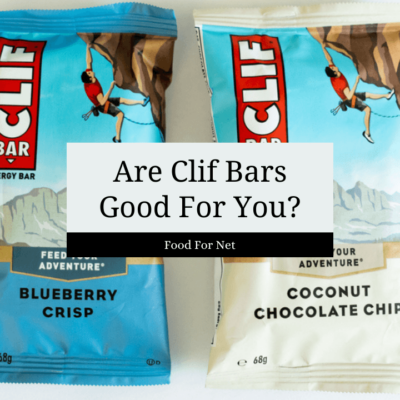
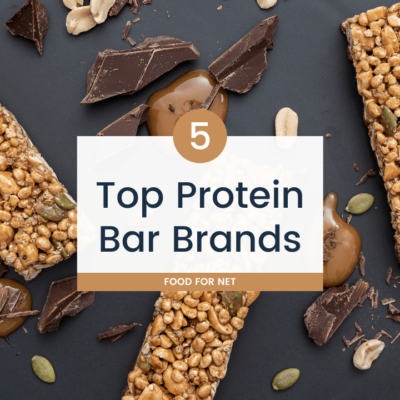
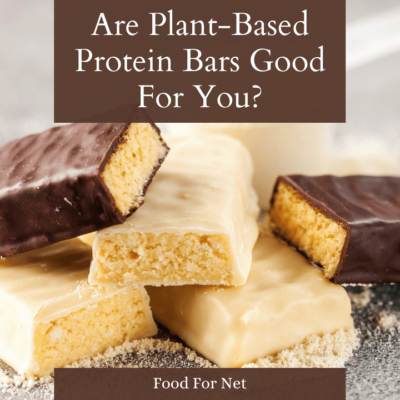

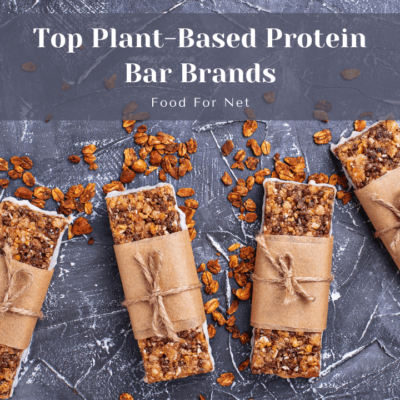
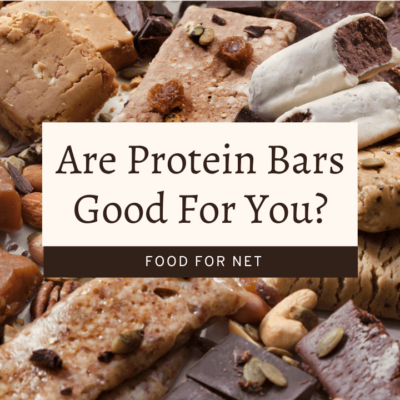
 Is Mustard Good For You?
Is Mustard Good For You?
Leave a Reply